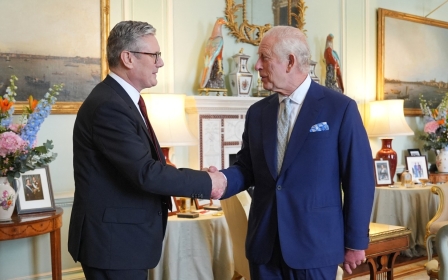UK election 2024: Five things we learned from Labour's landslide election victory
After fourteen years of Conservative rule, Britain has voted decisively for a change in government.
In a huge win, Keir Starmer's Labour Party has achieved a landslide victory, winning over 412 seats in Thursday's general election.
The Tories, who had won the last four elections, had a disastrous night.
They went from 371 MPs to just 121, spelling the end of leader Rishi Sunak's premiership.
Beyond the stark parliamentary seat count, several patterns and stories developed overnight.
New MEE newsletter: Jerusalem Dispatch
Sign up to get the latest insights and analysis on Israel-Palestine, alongside Turkey Unpacked and other MEE newsletters
Despite an overwhelming victory, shock wins for pro-Palestinian independent candidates, a shrinking of Labour's vote share in its safest seats, and the marked rise of a far-right anti-immigrant party, will leave the incoming government with much to consider over the next few months and years.
Middle East Eye analyses five themes that emerged from Thursday's results:
Starmer received less votes than Corbyn’s Labour
Despite winning a huge majority, Labour’s share of the popular vote is the lowest ever by a party to win a majority in British history.
Labour received 34 percent of the national vote, which translated to 64 percent of the seats in parliament. That disproportionate skew is due to the First Past the Post electoral system, which favours the two larger parties and attempts to circumvent perpetual coalition governments.
Starmer’s 34 percent is only marginally better than the 32 percent former left-wing leader Jeremy Corbyn’s Labour managed in the last election. In terms of raw votes, Labour received less support than it did in 2019 (9.7m votes vs 10.2m votes).
The 2024 vote share is comfortably worse than the 40 percent Corbyn’s Labour received in 2017. In that election, Labour won 12.9 million votes.
That paints a clear picture: Labour didn’t win this time round because it attracted more voters around the country than in recent elections; it won because the Tory vote collapsed.
The Tory vote share tanked from 44 percent in 2019 down to 24 percent. It translated to only 19 percent of seats in parliament - the worst performance in the Conservative’s history.
Pro-Palestine candidates deliver shock wins
While Labour celebrated 412 seat victories, there were a small number of constituencies in which it was outflanked by progressive or pro-Palestinian candidates.
Many of these were in areas with high proportions of Muslim voters, according to numbers compiled by The Muslim Vote based on UK census data.
In Dewsbury and Batley (39 percent Muslim population), independent candidate Iqbal Mohamed won a huge victory with a majority of 6,934.
Elsewhere, independent Shockat Adam beat Labour heavyweight John Ashworth in Leicester South by 979 votes. Ashworth was a senior figure in the shadow cabinet and was expected to be a key minister in the new government.
Ayoub Khan, another independent, beat longtime Labour lawmaker Khalid Mahmood by 507 votes, as the party’s vote share in the constituency tanked by 34 percent.
In Blackburn, Labour’s Kate Hollern was defeated by pro-Palestinian candidate Adnan Hussain by 132 votes. He remarkably won the seat that Labour had previously held with a majority of over 18,000.
The other independent win was for Corbyn, the former Labour leader who was last year blocked from standing for the party. He won comfortably on Thursday with a majority of 7,247.
In Bristol Central, the Green Party thumped Labour’s shadow culture secretary and key Starmer ally Thangam Debbonaire. Green co-leader Carla Denyer got 57 percent of the vote there, with a majority of over 10,000.
Bristol Central does not have a high Muslim population but has a history of progressive politics. The Greens won a further three seats elsewhere in the country.
The independent and progressive victories appear to show that Labour’s position on Israel’s war on Gaza has impacted its voters.
Keir Starmer’s decision to back Israel’s war in the first few months after 7 October, and an interview in which he appeared to condone Israel’s blocking of water and electricity from Palestinians, led to some traditional voters turning away from Labour.
Large Labour majorities are shrinking
There were several constituencies where Labour narrowly clung on to seats where it previously had huge majorities.
Once again, it mostly occurred in areas with high Muslim populations, and was likely impacted by its position on the war in Gaza.
In Bradford West, which has the highest Muslim population of any constituency (54 percent), Naz Shah’s previously huge majority was shrunk to just 707 by an independent candidate.
It was a similar story in Birmingham Yardley, where well-known Labour lawmaker Jess Phillips marginally beat the Workers’ Party by 693 votes.
Interestingly, both Shah and Phillips resigned from their positions on the frontbench to defy a three-line whip and vote in favour of a ceasefire in November.
Their performances show that for many voters concerned about the war in Gaza, those resignations did not matter: they wanted to punish Labour as a whole.
In Ilford North, shadow health secretary Wes Streeting beat British-Palestinian independent candidate Leanne Mohammed by just 528 votes. Streeting’s majority in 2019 was over 5,000.
Overall in areas with over 30 percent Muslim populations, Labour’s vote fell by around 20 points, according to Sky News.
In many other areas of the country that voted Labour in 2019, the party won fairly comfortably, but with much smaller majorities.
In Starmer’s own seat in Holborn and St Pancras, the new prime minister's majority fell from 27,763 to just 11,572, after a good showing by pro-Palestinian independent candidate Andrew Feinstein.
In general, Labour’s vote share in seats that had voted for the party in 2019 was down. A notable exception was Zarah Sultana, one of the most leftwing and pro-Palestinian lawmakers in the party, who increased her majority from just 401 to over 10,000.
The shrinking of Labour majorities could pose a problem for the party in future elections.
If the party moves to the centre ground on issues such as foreign policy, immigration and welfare, several of its candidates in former “safe seats” could be at risk from the Greens and independents.
Liberal Democrats will be an opposition force
One of the biggest winners of Thursday night was the Liberal Democrats, who went from just eight MPs to a whopping 71.
It picked up almost all those seats from the Conservatives, whose popularity in the south of England plummeted.
Although the Lib Dems have fluctuated in their political stances over recent years - they were part of a right-wing coalition government with the Conservatives in 2010 - the party this time round said it was "not fighting Labour".
On several issues, particularly foreign policy, the third largest party has been considered to be more progressive than Labour.
Party leader Ed Davey called for a ceasefire in Gaza much earlier than Starmer, and has also called for the UK to halt arms sales to Israel.
Notably, the Lib Dem's foreign affairs spokesperson, Layla Moran, is the first and only British MP of Palestinian descent.
Last year, wearing a Palestinian keffiyeh in parliament, Moran tabled a motion calling for the UK to commemorate the 75th anniversary of the Nakba - when over 750,000 Palestinians were displaced.
With the collapse of the Scottish National Party (from 47 lawmakers to just nine), the Lib Dems could well become the main opposition party attempting to keep Labour in check from veering to the centre-right.
The right is on the charge
The other key winners on the night, if not necessarily in seat share, was the Reform Party.
A successor to the UK Independence Party and the Brexit Party, Reform won 14 percent of the national vote share.
It only translated to winning four seats (less than one percent of seats), with the small party being a victim of the so-called first past the post system.
Among those four winners were the party’s leader Nigel Farage, its chairman Richard Tice and defected former Tory MP Lee Anderson.
The surge in Reform could have major consequences on the future of Britain.
When combined, Reform and Conservatives received 39 percent of votes in the UK - more than Labour. If the far right had come to an agreement with the Tories to not stand in their way - as they did with Boris Johnson’s government in 2019 - it could have blocked Labour’s majority.
There were swathes of seats where the sizeable Reform vote was larger than the difference between Tories and Labour.
That means that in the coming months, we could see the Conservatives move significantly to the right to win back those voters, possibly under a right-wing leader such as Suella Braverman or Kemi Badenoch. We could even see a merger between the Tories and Reform.
Many analysts are predicting that the far-right party will only get stronger: this time round it was caught by a quick snap election, leaving the relatively new party with little time to prepare.
But it still managed to make significant inroads with its anti-immigrant and anti-refugee sentiments.
In future elections, Labour will feel threatened by Reform too. In several seats, particularly in northern England, Reform is now Labour's main competitor.
That could lead to a rightward shift in Labour’s stances on immigration, the European Union and other issues - something we already saw in the election campaign.
Middle East Eye delivers independent and unrivalled coverage and analysis of the Middle East, North Africa and beyond. To learn more about republishing this content and the associated fees, please fill out this form. More about MEE can be found here.






